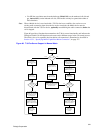318
Dialogic Corporation
case GCEV_ACCEPT_XFER_FAIL:
// Failed to accept incoming transfer request
PrintEventError(&metaEvent);
break;
case GCEV_REJ_XFER:
// Rejected incoming transfer request
break;
case GCEV_REJ_XFER_FAIL:
// Failed to reject incoming transfer request
PrintEventError(&metaEvent);
break;
case GCEV_XFER_CMPLT:
// completed transferred call
break;
case GCEV_XFER_FAIL:
// Failed to complete the transferred call
PrintEventError(&metaEvent);
break;
/////////////////////////////////////////
// Party C events
/////////////////////////////////////////
case GCEV_OFFERED:
// Received incoming call
// Normall incoming call handling
...
break;
...
}
...
}
void PrintEventError(METAEVENT* pEvent, long evtDev)
{
int gcError; /* GlobalCall Error */
int ccLibId; /* CC Library ID */
long ccError; /* Call Control Library error code */
char *GCerrMsg; /* GC pointer to error message string */
char *errMsg; /* CCLIB pointer to error message string */
if(gc_ResultValue(pEvent, &gcError, &ccLibId, &ccError) == GC_SUCCESS)
{
gc_ResultMsg(LIBID_GC, (long) gcError, &GCerrMsg);
gc_ResultMsg(ccLibId, ccError, &errMsg);
printf("Ld 0x%lx, GC (%d) %s, CC (%ld) %s, (%s)\n",
evtDev, gcError, GCerrMsg, ccError, errMsg, ATDV_NAMEP(evtDev));
}
}
4.25.5.5 Handling a Transfer Request
The following code snippet illustrates how party B handles an incoming transfer request (REFER).
Party B can either reject the request or accept it. Note that if no rejection reason is specified, the
default reason, 603 Decline, is used.


















